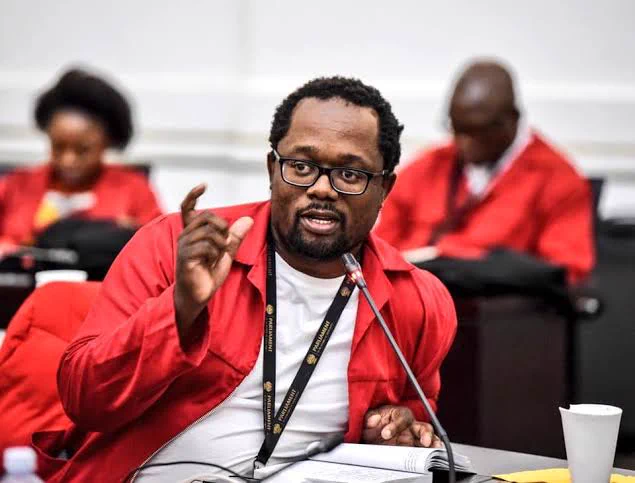The EEF member and Joburg MMC for public safety, Mgcini Tshwaku | Image Twiiter
A contentious debate has emerged within South Africa's political landscape as the nation grapples with the escalating threat posed by heavily armed illegal miners, colloquially known as "zama zamas." The crux of the debate centers around the opposing viewpoints of Gauteng Premier Panyaza Lesufi and Mgcini Tshwaku, an influential member of the Economic Freedom Fighters (EFF) and Joburg's MMC for Public Safety, regarding the deployment of the South African National Defence Force (SANDF) to address the issue.
The zama zama phenomenon has cast a shadow of fear over communities located near abandoned mines, as these illegal foreign miners are reportedly wreaking havoc and causing widespread panic. National Commissioner of the South African Police Service (SAPS), Gen Fannie Masemola, has openly admitted that the police force is ill-equipped to handle the heavily armed zama zamas, further amplifying the urgency of the situation.
Gauteng Premier Panyaza Lesufi has been vocal in his appeal to President Cyril Ramaphosa to deploy SANDF troops as a means of countering the heavily armed illegal miners. During a recent National Working Committee oversight visit to the province, Lesufi directly addressed the president, advocating for a robust response to confront the zama zama threat head-on.
"They come from other countries, so we wanted to protect our territory, and the only way to protect our territory is to get the necessary firepower this country can possess and ensure that it's toe to toe and let the last man stand," Lesufi asserted.
However, the debate over deploying the SANDF troops has been complicated by the dissenting voice of Mgcini Tshwaku. As a member of the EFF and Joburg's MMC for Public Safety, Tshwaku's influence in matters of security policy cannot be understated. Tshwaku opposes the idea of sending the SANDF to confront the zama zamas, contending that such an approach would be a "waste of time."
Tshwaku's alternative proposition is a multifaceted strategy that encompasses not only addressing the immediate threat but also focusing on long-term solutions. He advocates for filling in abandoned mine shafts, clearing overgrown areas, involving local communities in legalizing small-scale mining, and ensuring comprehensive protection of citizens throughout the mining process. This approach, he argues, could lead to sustainable economic growth and safer mining practices.
The contrasting perspectives of Lesufi and Tshwaku mirror broader ideological differences, with Lesufi emphasizing a strong, direct response to ensure territorial integrity, and Tshwaku highlighting a more nuanced, community-centric strategy to tackle the zama zama crisis. As the South African government weighs these opposing viewpoints, it faces a complex decision that could not only shape its approach to the immediate issue but also set a precedent for addressing future challenges.
reports by The Truth panther


